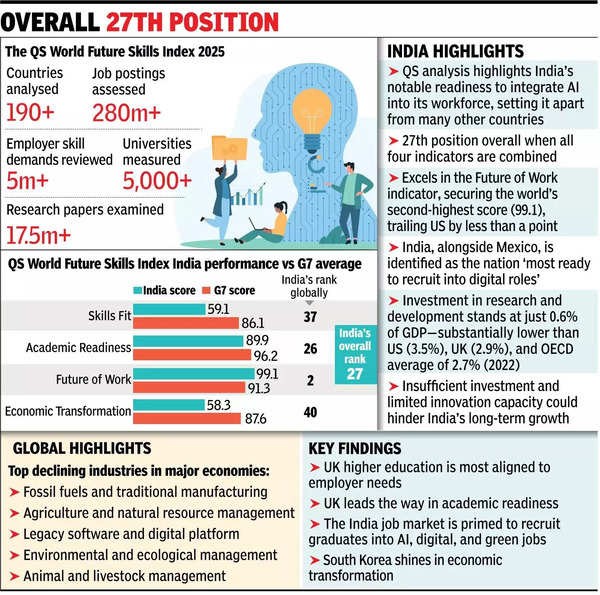
In a groundbreaking assessment of global workforce readiness, India has secured the second position worldwide in Future of Work skills, according to the inaugural QS World Future Skills Index. The comprehensive study, which analyzed over 190 countries, positions India behind only the United States in this crucial category.
The survey reveals India's overall ranking at 27th place, with specific rankings of 37th in Skills Fit, 26th in Academic Readiness, and 40th in Economic Transformation. This achievement reflects nearly a decade of dedicated effort under India's national skilling mission.
The extensive study examined over 280 million job postings, skills demands from more than five million employers, data from over 5,000 universities, and 17.5 million research papers. India's strong performance particularly shines in artificial intelligence (AI) integration, with a remarkable 59% active AI deployment rate among companies.
According to Matteo Quacquarelli, QS vice president of strategy and analytics, "India's exceptional GDP growth, developing economy, and youth population create a unique global position." He projects India's economy to grow at an average of 6.5% annually between 2025 and 2030.
The report highlights India's strengths in:
- AI and digital technology adoption
- Green skills implementation
- Innovation readiness
- Venture capital attraction in Asia Pacific
However, the study also identifies areas for improvement:
- Enhanced higher education system
- Better alignment of graduate skills with employer demands
- Increased industry-academia collaboration
- Greater investment in research and development
The World Economic Forum forecasts substantial growth in skill demands by 2030, including a 60% increase in AI skills and a 35% rise in digital skills, alongside the creation of 24 million green jobs. India's high score of 99.1 in the Future of Work indicator suggests strong positioning to meet these evolving demands.
The findings align with India's 2020 National Education Policy, emphasizing the need for continuous adaptation to changing skill requirements in the workforce. As global industries undergo transformation, India's proactive approach to educational reform and skill development appears to be paying dividends in preparing its workforce for future challenges.